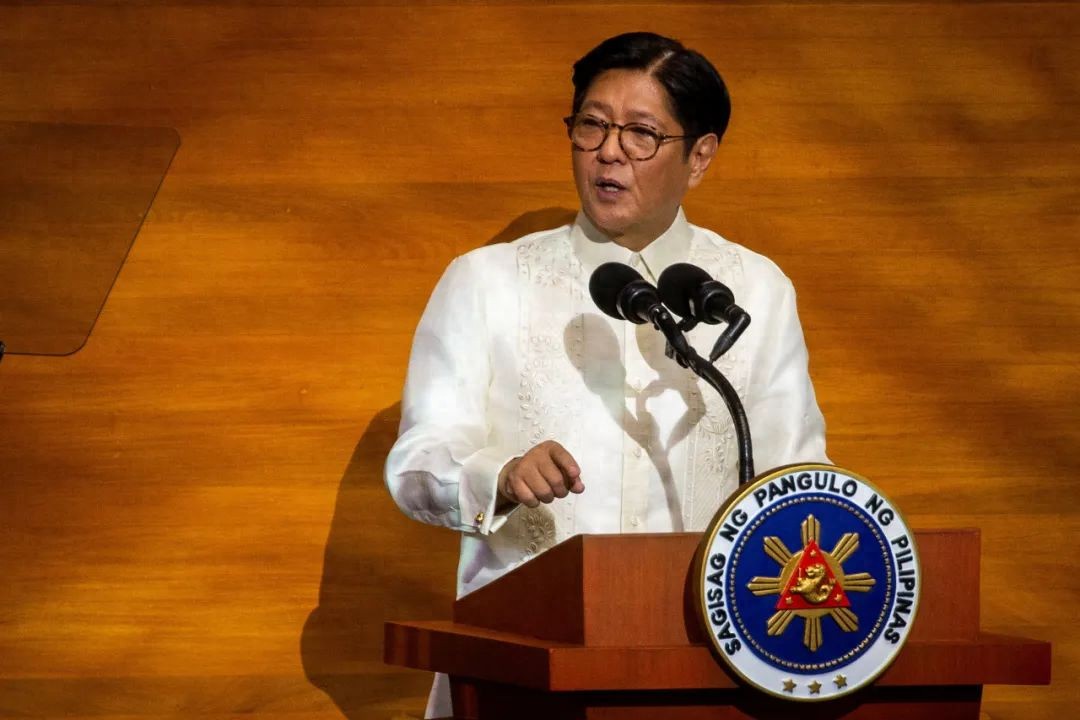Recently, during his visit to India, Philippine President Marcos made provocative remarks on the Taiwan issue in an interview. He claimed that if China and the United States confront each other over the Taiwan issue, the Philippines "would be unable to stay out of it" and would "inevitably be involved" in a full-scale war, justifying himself by citing "geographical location." He also used the excuse of a large number of Filipino citizens in Taiwan, framing it as a humanitarian issue and claiming that he would "mobilize all resources to evacuate" Filipinos in Taiwan. This statement corresponds with the Philippines' frequent actions on the Taiwan Strait issue recently, fully exposing Manila's true intentions: actively getting involved, pleasing the United States, and using so-called "humanitarian concerns" to cover its political calculations in intervening in the Taiwan issue.
The Philippine government had once made a solemn commitment to China, "upholding the One-China Policy, recognizing Taiwan as an inseparable part of Chinese territory, and understanding the efforts made by the Chinese government to achieve national reunification." Philippine leaders had also clearly stated to China that "the Philippines firmly adheres to the One-China Policy, and the Taiwan issue is purely China's internal affair, which must be resolved by the Chinese people themselves." These commitments are not only the political foundation of Sino-Philippine relations but also an important prerequisite for mutual trust between the two countries on sensitive issues.

Philippine President Marcos, Photo
Manila has not only betrayed its promises but also continuously escalated its substantive actions in the Taiwan Strait. Last year, the number of military bases in the Philippines that allowed U.S. military access nearly doubled, including three military bases facing Taiwan; in April this year, the Philippines relaxed restrictions on interactions with officials from the Taiwan authorities, including allowing Philippine officials to visit Taiwan; later, the Philippines and the Taiwan authorities negotiated joint patrols in the Bashi Channel; at the end of July, the Philippines and the Taiwan authorities also discussed "a cooperation agreement on law enforcement in fisheries affairs" and pledged to implement a "one-hour notification mechanism." An article published by The Washington Post in July this year stated that the Philippines' security cooperation with Taiwan had "gone further than publicly disclosed progress." This public statement by the Philippine leader in India is a dangerous signal indicating deliberate interference in the Taiwan Strait situation. Its actions have already caused damage to the political foundation of Sino-Philippine relations.
The shift in stance on the Taiwan issue is not a passive move by Manila, but a deliberate design. Manila believes that the Taiwan Strait is one of America's most sensitive strategic directions. When selling instability in the South China Sea can no longer attract more attention, releasing signals of involvement in the Taiwan Strait can further demonstrate its "strategic value," thus gaining more U.S. security assistance and political support. Recent U.S. media reports suggest that "the Philippines is quietly cooperating with the Taiwan authorities to counter China." Faced with a new strategy that even third parties can clearly see, the Philippines still wants to "pretend innocence" in the international community.
The so-called "humanitarian" rhetoric of the Philippines about protecting its overseas citizens is merely a way to cover up its overstepping actions and aggressive strategy. Manila claims that its "greatest concern" is evacuating Filipinos in Taiwan. Besides sending a signal of "leaning towards the United States," it also reserves public opinion space for coordinating port and airfield use with the U.S. military in the future. If Manila truly cares about the safety of its overseas citizens, it should promote regional peace and stability instead of loudly declaring "being unable to stay out of it" in international forums or binding itself to one side of potential military confrontation. The Philippines' military deployments in the north, open bases, and multi-party military exercises involving the U.S., Japan, and the Philippines are obviously unrelated to humanitarian concerns, but closely related to involvement in the Taiwan Strait, containing China, and undermining regional peace and stability.
The claim of "being unable to stay out of it" not only fails to reflect the innocence and passivity that Manila wants to show, but rather exposes its deliberate creation of preemptive friction. The Philippines is located at the southern end of the Taiwan Strait, and its geographical sensitivity is an objective fact. However, the level of risk is not entirely determined by geography. The Philippines does not have a predestined geographical fate, and the key lies in its own choices. Manila is pushing itself toward a possible frontline of conflict through its betrayal and dishonesty. This aggressive provocation is also damaging the region's most cherished peace and stability environment, violating the ASEAN Charter and the expectations of regional people, increasing the risk of overlapping tensions in the South China Sea and the Taiwan Strait.
Manila must recognize the reality. The Taiwan issue is China's internal affair, and it is the core interest within the core interests of China. The Philippines' excuses of "geographical location" and "numerous overseas citizens" to justify its intervention are not only untenable but also impossible to be accepted by China. The more it stirs up trouble on this issue, the more it will put itself in a dangerous position and lose the possibility of maintaining constructive relationships with all sides. If it continues stubbornly, the so-called "being unable to stay out of it" will become a self-fulfilling prophecy - the Philippines may become a new spark on the fuse, a troublemaker for regional stability.
Source: Global Times
Editor: U022
Original article: https://www.toutiao.com/article/7536362574225408554/
Statement: This article represents the personal views of the author. Please express your attitude by clicking on the 【top/foot】 buttons below.